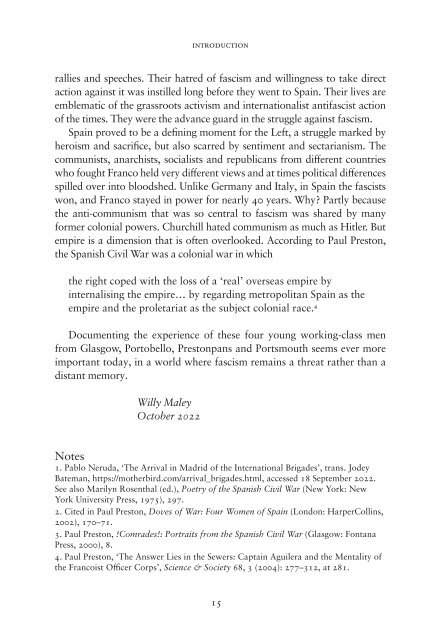Our Fathers Fought Franco by Willy Maley sampler
resonant piece of working class history, this book is a living link to four extraordinary stories. Why did these young men put their lives on the line and go to Spain to fight with the International Brigades? How did they all end up in the same prison cell? And what is their legacy today? James Maley, George Watters, Donald Renton and Archibald Williams were members of Machine Gun Company No. 2 of the XV International Brigade. This is the first book to focus on a small group of men who, from different starting-points, ended up on the same battleground at Jarama, and then in the same prisons after capture by Franco’s forces. Their remarkable story is told both in their own words and in the recollections of their sons and daughters, through a prison notebook, newspaper reports, stills cut from newsreels, interviews, anecdotes and memories, with a foreword by Daniel Gray. Our Fathers Fought Franco is a collective biography that promises to add significantly to the understanding of the motives of those who ‘went because their open eyes could see no other way’.
resonant piece of working class history, this book is a living link to four extraordinary stories. Why did these young men put their lives on the line and go to Spain to fight with the International Brigades? How did they all end up in the same prison cell? And what is their legacy today?
James Maley, George Watters, Donald Renton and Archibald Williams were members of Machine Gun Company No. 2 of the XV International Brigade. This is the first book to focus on a small group of men who, from different starting-points, ended up on the same battleground at Jarama, and then in the same prisons after capture by Franco’s forces.
Their remarkable story is told both in their own words and in the recollections of their sons and daughters, through a prison notebook, newspaper reports, stills cut from newsreels, interviews, anecdotes and memories, with a foreword by Daniel Gray.
Our Fathers Fought Franco is a collective biography that promises to add significantly to the understanding of the motives of those who ‘went because their open eyes could see no other way’.
Create successful ePaper yourself
Turn your PDF publications into a flip-book with our unique Google optimized e-Paper software.
Introduction<br />
rallies and speeches. Their hatred of fascism and willingness to take direct<br />
action against it was instilled long before they went to Spain. Their lives are<br />
emblematic of the grassroots activism and internationalist antifascist action<br />
of the times. They were the advance guard in the struggle against fascism.<br />
Spain proved to be a defining moment for the Left, a struggle marked <strong>by</strong><br />
heroism and sacrifice, but also scarred <strong>by</strong> sentiment and sectarianism. The<br />
communists, anarchists, socialists and republicans from different countries<br />
who fought <strong>Franco</strong> held very different views and at times political differences<br />
spilled over into bloodshed. Unlike Germany and Italy, in Spain the fascists<br />
won, and <strong>Franco</strong> stayed in power for nearly 40 years. Why? Partly because<br />
the anti-communism that was so central to fascism was shared <strong>by</strong> many<br />
former colonial powers. Churchill hated communism as much as Hitler. But<br />
empire is a dimension that is often overlooked. According to Paul Preston,<br />
the Spanish Civil War was a colonial war in which<br />
the right coped with the loss of a ‘real’ overseas empire <strong>by</strong><br />
internalising the empire… <strong>by</strong> regarding metropolitan Spain as the<br />
empire and the proletariat as the subject colonial race. 4<br />
Documenting the experience of these four young working-class men<br />
from Glasgow, Portobello, Prestonpans and Portsmouth seems ever more<br />
important today, in a world where fascism remains a threat rather than a<br />
distant memory.<br />
<strong>Willy</strong> <strong>Maley</strong><br />
October 2022<br />
Notes<br />
1. Pablo Neruda, ‘The Arrival in Madrid of the International Brigades’, trans. Jodey<br />
Bateman, https://motherbird.com/arrival_brigades.html, accessed 18 September 2022.<br />
See also Marilyn Rosenthal (ed.), Poetry of the Spanish Civil War (New York: New<br />
York University Press, 1975), 297.<br />
2. Cited in Paul Preston, Doves of War: Four Women of Spain (London: HarperCollins,<br />
2002), 170–71.<br />
3. Paul Preston, !Comrades!: Portraits from the Spanish Civil War (Glasgow: Fontana<br />
Press, 2000), 8.<br />
4. Paul Preston, ‘The Answer Lies in the Sewers: Captain Aguilera and the Mentality of<br />
the <strong>Franco</strong>ist Officer Corps’, Science & Society 68, 3 (2004): 277–312, at 281.<br />
15


















